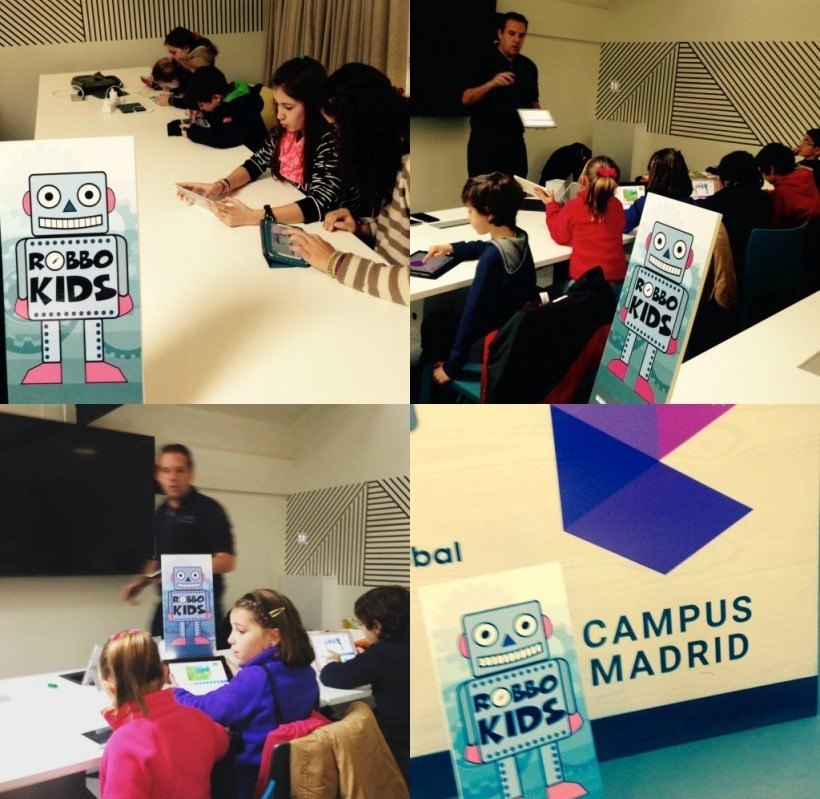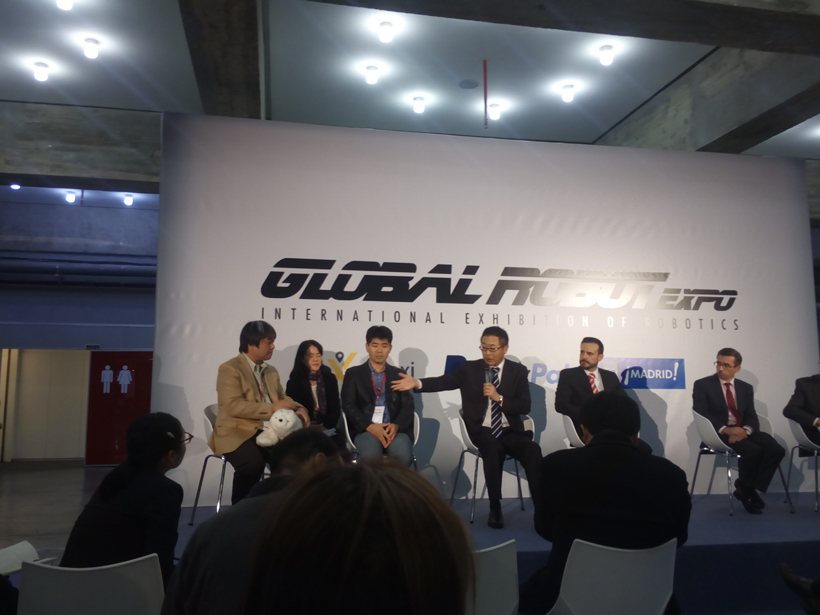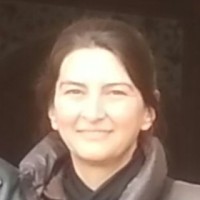Teaching Technology, Programming, And Robotics In Schools In Spain
I met Beatriz Velasco in a training consultancy whose name I do not remember. She arrived with her smile and eyes full of light, a portfolio full of proposals, the head awake and eager to get the market into her pocket. As so often, the impetus, enthusiasm, and talent were stopped by the opposition to change that oxidizes the gear of some large corporations.
But Beatriz did not give in, and when she was told “The thing is, you don’t think like us", she could not agree more. She left her comfort zone in the company, took the risk, and rushed to start her own business, Robbokids, a fresh from the oven startup dedicated to teaching technology, programming, and robotics. But let her tell us by herself:
"I started about six months ago, offering schools and teachers the opportunity to do different things with kids. Programming and robotics are fun, and now there are very simple tools with which children can learn not only programming, but also other skills such as math, verbal skills, and even languages as well.
Then, on the side of teachers, they also see that students attend, that they are interested, and so teachers have other tools to interact with children.
Robbokids arises when detecting the need for teachers and students in schools. We started to create small workshops where we taught Scratch programming for beginners. If children are a little more advanced, we put challenges; we work with code.org, where they have different games like Star Wars, which they like a lot, and they have a lot of fun, indeed.
Earlier this month, we were in the Madrid Campus of Google giving a free workshop and 20 children from 6 to 15 years old came. When we saw them coming in, we said: 'Oh! Let's see what we can do with this age difference!' Roberto, who is the teacher, was thinking: 'Let's see how we handle this.'"
But robotics made its magic, and in an hour and a half, all children were sitting and working. As Roberto also customized each student learning path, they left super happy, because they saw that with such a wide age gap it is possible to do a workshop. Until then, they had only worked with littlest children, seven or eight years old.
Besides programming, Beatriz collaborates with another company called ChromVille for augmented reality, where children colorize with some tabs, and thus work on issues such as motor skills, correct restraint of pen, drawing, etc., and then, on the other side, with tablet or mobile devices children use an app with which they see the drawing in augmented reality. Children enjoy this very much.
"We are also working with virtual reality with google glasses", says Beatriz, "which is an application of gaming and entertainment, and that it is a way that for example allows children to get to know New York, they play Psychomotor games or logical thinking activities".
"Finally, we are also working with drones. We use them to acquire the necessary skills to lead the drone. We have flying and running drones. With the flight ones, we are careful to respect the rules for the issue of height and other considerations”.
"At this moment, we give workshops; We work with play centers and hubs for entrepreneurs where we will teach these workshops. The idea is to go beyond, to teach in schools, in training centers: Instead of taking the kids to the science museum, we want the science museum to go to children; for example, with virtual reality, this may be feasible."
https://youtu.be/zZjK4viswe0
Training The Trainers
"Another way we want to open is indeed teachers training: We are already having a proposal to train teachers in these tools, not only in Scratch, but also in App Inventor; teachers themselves can create applications, such as math, and children enjoy it. We want them to be aware that it is necessary to introduce these tools in the classroom, because they are already in the lives of children. It is a way to approach them and help them get to learn". Beatriz went to the Francisco de Vitoria University, where she was informed that they needed at least an awareness chat for teachers to know what programming is about and for them to assimilate the need to incorporate it. There are already doing even careers and degrees of robotics focused on teachers.
Technology, Programming, And Robotics Course
Beatriz tells us that "in relation to the new subject of Technology, Programming, and Robotics from the Madrid Community, a training plan was given; what happens is that teachers are something inexpert and with that training they fall short, they need more knowledge".
"I liken it to bilingualism" she says. " Yes, it has been implemented, there are schools that are doing well, but there are still gaps because there are teachers who have not yet reached the required level. In this subject, the same is true: Although there are teachers who do wonders, in fact from many years ago, knowledge is not implemented as such".
We ask Beatriz about the possibility of teaching the official subject of Technology, Programming, and Robotics and she answers: "Although it is complicated, it is something I would like to cover; however, since there are companies with a long run, and on the other hand, what schools are trying is to train their staff and do everything lowering costs."
We consulted her if she knows the steps to teach curriculum subjects in schools and she answers us that she spoke with a firm that bears religious centers throughout Spain, where she was informed that some important quality requirements are requested: That trainers were qualified, and she believes that's what it has to be. On specific procedures, Beatriz has her doubts, so from LearningLovers.org we have investigated about it.
The Ministry of Education in Spain confirms us that the subjects of the ESO, as in the case of Technology, Programming, and Robotics are derived to the Autonomous Communities. Then we turn to the Community of Madrid, where we are reported from the Department of Inspectorate Education that this possibility is restricted to private schools, since in public and subsidized schools they can only hire to outsider companies the activities and school workshops (after hours of teaching the official subjects).
The Educational Inspection Service also indicates us that for private schools, teachers must meet education and experience requirements and get to be part of the faculty of the school. However, it seems that there is no legal impediment for the payment of the teacher to become "delayed" (ie., the school hired an outside company, and this in turn pays the teacher, as is regulated in the Law 14/1994 of June 1st).
Regarding the contents to be taught, they must comply with the regulations in force in each region. In the case of Madrid, for example, the curriculum of the subject of Technology, Robotics and Programming is regulated by Decree 48/2015 of May 14th, published in the Official Gazette of the Community of Madrid. On page 297 and following you can see the table of contents that should cover the subject in the courses of first, second and third of ESO.
In the event of wanting also to provide the course materials (textbooks, for example), to ensure compliance with the official curriculum, first you have to certify it in the corresponding local Counseling of Education. In Madrid, you must go in person to its headquarters located on the street Gran Vía, 20 to manage it.
What implications would this model of outsourcing have? For private schools, it means that an outside firm would be responsible for previously making the selection of teachers, ensuring compliance with established legal requirements; also it would not have to make an investment in the purchase and maintenance of devices (robots, 3D printers...) as it would be provided on a rental basis by the company. Moreover, by functioning as a temp agency, monitoring of teachers would be ensured, and if he/she should not give the expected results, the school might request the replacement by another professional that best suits their needs.
From the point of view of the school, recruitment would be managed directly with the company, not with the teacher, and it could have the nature of work and service for a limited time, so that the contractual relationship would resume if it were the case, based on center needs.
From the point of view of the teacher, his/her employment contract would be established with the company, which will facilitate the job search in clients schools and other entities such as associations of parents, school associations, etc., where they could request their services during no school periods for teaching workshops, camps, extracurricular activities, etc. On the other hand, if a school decides to do without the services of a teacher, he/she would not be unemployed, and he/she would keep its contract with the company, that could offer him/her other opportunities in other schools or institutions clients.
In relation to this system, Beatriz believes that "it is a model that should be, because schools do not have to be experts in everything. They are good at managing education, managing students and maybe in the most common subjects, but they do not have to have all the knowledge"; it seems well to her that schools would open the door to some companies in order to enter and work together. She thinks "it should be, and more on subjects like these where you have to be innovating all the time; you have to know what 's out, and if in the end the teacher is in the classroom, he/she cannot be out. Having companies that can help them to innovate would be a perfect collaboration".
The Market Situation
"Right now there are boom," says Beatriz. "Everyone thinks you can do programming and robotics workshops and go. But this has to have continuity, and there are teachers who come from far away doing programming and robotics in the classroom, maybe not with what is now known, but with what he/she had at the time. In fact, I started with the idea because my father was a programmer and when being tiny (maybe I was 7 or 8 years old), he began to give us classes and programming. It is true that ‘the tailor's wife is the worst clad’, and we did not listen to him, and now I regret it. When I returned to take up the idea I thought 'If I had learned programming at the time, maybe right now I would have a very advanced way.'"
"There are companies that exist from a long time ago and are good, and there are others that are appearing due to the opportunity they are seeing now and I think you have to take it seriously. I have been six years working in Education, visiting schools, seeing their needs, and certainly there is a long way still to do and you have to have continuity, other than a fad."
Spain Compared To Other Countries
"I speak from what I see in Spain and how little or much I've seen outside. I have been in London, for example, watching schools; yes, they took me to the schools that were more advanced; then you compare it to some of the Spanish schools and you say: 'Oh my God, we have a bottomless pit!' But I know there are schools in Spain who are really doing good things. For example in Carabanchel, which is a medium family neighborhood, where the school is arranged they are doing a very good job, both the director and teachers, who are creating their own content on a platform; now they are already messing with robotics with Arduino issues... I think Spain is on the road, and there is still a long way to go, but we're in a good spot."
Do You Speak English?
Beatriz will work in English. That is very clear as it can be the turning point to offer added value. They will collaborate with a language entity in the area of Getafe, in Madrid. In fact, they already have demands from schools to give workshops in English. Beatriz also thinks that "when it comes to programming, doing it in English would be something natural". "Parents may obtain a formal class as two; maybe children will not learn English grammar, but that they will learn it at school, so it would be a way to practice English and learn over programming."
Job Vacancies
In fact, Beatriz is looking for trainers to give English programming. She herself is learning programming so if at a given moment she has to teach the class, it could be in English. She is offering a teaching job for engineering students or teachers, or some kind of career focused on training delivery, with some technology skills; they would be provided with in-depth training of what the teacher should do. At the moment, they offer a salary for students and a temporary contract.
Aid For Startups
They were in Impact Hub, which is in Atocha in Madrid. They were very well received, and they were told they would like to talk to them later, as they liked the idea. Then they visited Google Campus Madrid, which also functions as an incubator, and that gave them facilities: Earlier this month, they organized a workshop for 20 children, for whom did not have to pay anything; They helped them with communication networks, they put it on the web. They also sent the project to a foundation, to a museum, offering free or almost at cost price, though it is still complicated.
eLearning
At this moment, they are giving face to face learning. They plan to create a platform with video tutorials for parents, because sometimes parents are a little off the hook on this issue and they cannot help their children; in fact, it is often the opposite: It is the children who help their parents.
"We understand that this issue about technology has to have a serious treatment –says Beatriz– and for that, parents have to be trained. The best way for parents to get trained is through eLearning."
Feedback
Beatriz considers device companies are creating good products that can reach the market very well, but they lack an intermediary, a commercial professional, someone who comes right in the end user. "Teachers are in the classroom and they will not visit a trade show, and the show does not seem to get close to schools", she says. "Binding step is missing. Like the seller needs a good product, those who have a good product need a good seller. It takes a next level or an intermediate level between manufacturers and end users".
"Children are super creative and I am sure they can give much feedback to suppliers. Even posing some experiment, uniting children with manufacturers might be fine at a given point", says Beatriz.
https://youtu.be/Q3FMaYORuLI
Special Educational Needs
"Kids look so passionate... In all workshops we have done, there has always been a child that was a little shyer; the other day, there was one deaf and visually impaired child. The father told us about it so that we could have it in mind. It was surprising: The child did all the exercises that the teacher requested him, he raised his hand and asked, and then when we told the father about it, he was excited; this can be very inclusive".
Opinion From Parents
"They are very happy. The other day they wanted to get into the workshop. We told them that they could not come at the beginning of the activity, because children, when they are with parents, get 'fool', and they do not pay attention and are more focused on the father. We asked them to participate during the last 15 minutes. They entered, and it is true that children, who were all time quiet, when parents arrived, they rose, but to show them what they had done, and feeling proud about it. The parents were surprised at what their children had created".
"Always, before a child is playing a video game, it is preferable that he/she creates it, becoming the creator of his/her own game, which is super creative and giving the child some tools for the future; although he/she will not become a programmer, for many other things it will be useful".
Parents' Associations
So far, they have not met with them. They have always gone to the principals of schools and they have not had the chance to see the parent’s associations. Yes they want to do it and make them aware that this exists and that they must be prepared.
Beatriz says goodbye telling us that she is excited: "You have to jump and not being afraid; it is true that you can go wrong, but when programming, one thing you learn is exactly that, you're wrong and nothing happens; you start again, you go back to try again... it helps you solve the problem!"









